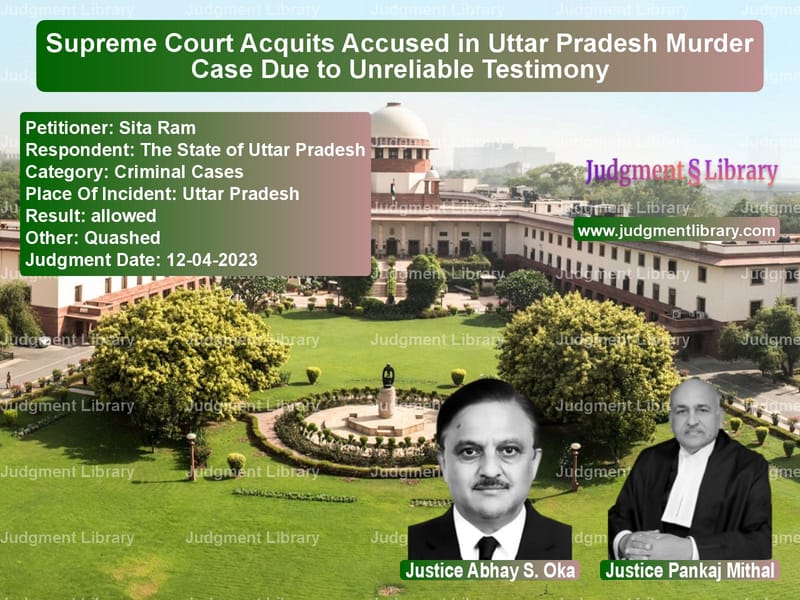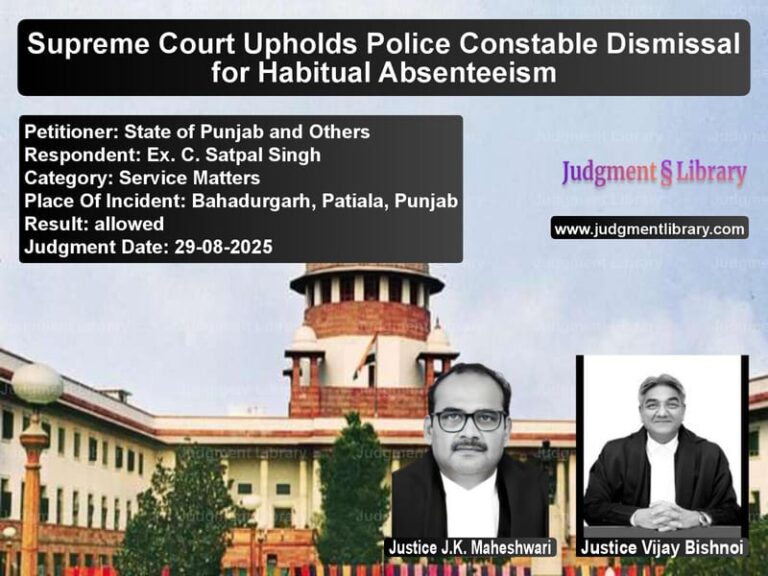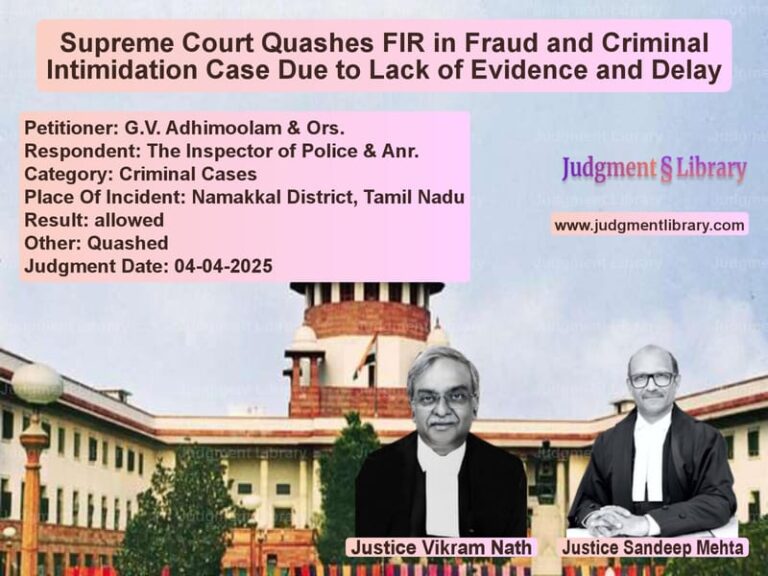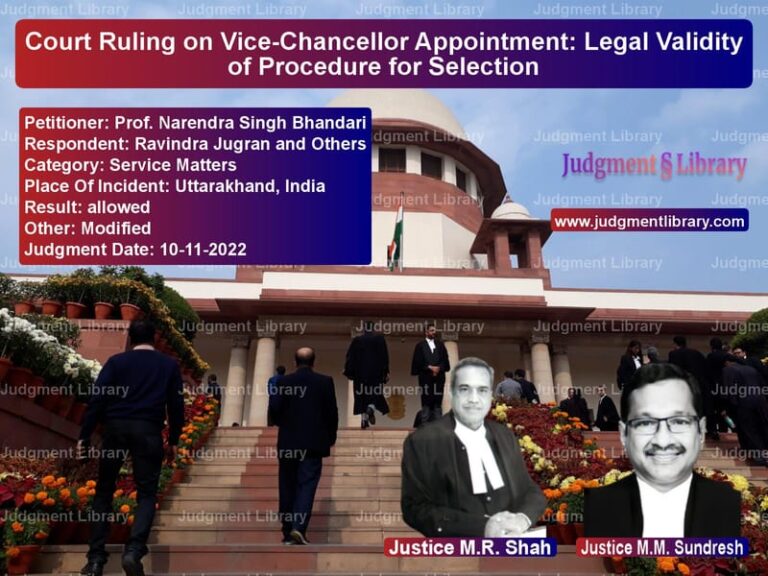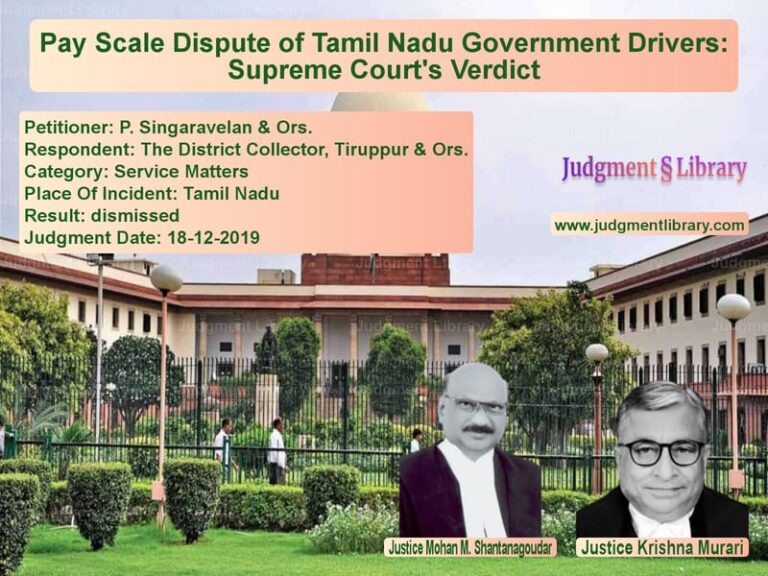Supreme Court Acquits Accused in Uttar Pradesh Murder Case Due to Unreliable Testimony
The case of Sita Ram vs. The State of Uttar Pradesh is a significant judgment where the Supreme Court overturned the conviction of an accused due to unreliable eyewitness testimonies and procedural lapses in the prosecution’s case. The case revolved around a long-standing enmity between two groups, culminating in a violent altercation that led to a murder.
Background of the Case
The incident occurred on August 17, 1984, when an altercation broke out between two groups in a village in Uttar Pradesh. The prosecution alleged that the accused, including Sita Ram (Appellant) and others, attacked the complainant’s family with weapons, resulting in the death of Karam Hussain. The accused were charged under Section 302 read with Section 34 and Section 325 read with Section 149 of the IPC.
The trial court convicted eight accused based on the testimonies of PW-1 (Uday Raj Maurya) and PW-2 (Ram Aadhar). Sita Ram and one other accused were sentenced to life imprisonment, while the others were given lesser sentences. The Allahabad High Court upheld the conviction. However, Sita Ram challenged the decision before the Supreme Court, arguing that the conviction was based on unreliable eyewitness testimony and procedural flaws.
Arguments by the Petitioner (Appellant)
The appellant, Sita Ram, contended that:
- “The prosecution’s case was based on eyewitness testimonies that were contradictory and unreliable.”
- “Both PW-1 and PW-2 admitted during cross-examination that they had not seen which accused assaulted the deceased.”
- “Three independent eyewitnesses who were present during the incident were not examined by the prosecution.”
- “The case was influenced by prior enmity, which raises doubts about the fairness of the allegations.”
Arguments by the Respondent (State of Uttar Pradesh)
The prosecution defended the conviction, stating that:
- “Both PW-1 and PW-2 clearly testified that the appellant assaulted the deceased with the blunt edge of a spade.”
- “Medical evidence corroborates the injuries sustained by the deceased, aligning with the prosecution’s version of events.”
- “The High Court correctly upheld the conviction based on a thorough assessment of the evidence.”
Supreme Court’s Analysis and Judgment
The Supreme Court critically examined the prosecution’s evidence and found multiple flaws in the testimonies of the key witnesses:
- “PW-1 and PW-2, in their cross-examinations, admitted that they did not see who exactly attacked the deceased, creating serious doubts about their reliability.”
- “The prosecution failed to examine three independent eyewitnesses whose statements were recorded during the investigation.”
- “One of the independent eyewitnesses, Munif, was present in court but was not examined, raising further doubts about the credibility of the case.”
- “The conviction cannot rest solely on uncorroborated testimony from interested witnesses, especially when they admit to not witnessing the assault directly.”
Based on these findings, the Supreme Court allowed the appeal and acquitted the accused. The judgment emphasized:
“We hold that the prosecution has failed to prove the guilt of the appellant beyond a reasonable doubt. Hence, the conviction of the appellant under the impugned judgment and orders is set aside.”
Key Takeaways from the Judgment
- Unreliable eyewitness testimony can lead to an acquittal, especially when identification of the accused is doubtful.
- Failure to examine independent witnesses can weaken the prosecution’s case.
- Prior enmity between parties can indicate a possibility of false implication.
- Judicial scrutiny is essential in cases where convictions rest primarily on oral testimony.
Impact of the Judgment
This ruling reinforces the principle that convictions must be based on clear and credible evidence. It highlights the responsibility of the prosecution to ensure that all available witnesses are examined and that testimonies are consistent. The case serves as a precedent for ensuring fairness in criminal trials, particularly in cases involving longstanding disputes.
Read also: https://judgmentlibrary.com/supreme-court-overturns-high-court-decision-on-nia-bail-cancellation/
The Supreme Court’s decision in this case upholds the fundamental legal principle that guilt must be established beyond a reasonable doubt and that procedural fairness is essential in criminal justice.
Petitioner Name: Sita Ram.Respondent Name: The State of Uttar Pradesh.Judgment By: Justice Abhay S. Oka, Justice Pankaj Mithal.Place Of Incident: Uttar Pradesh.Judgment Date: 12-04-2023.
Don’t miss out on the full details! Download the complete judgment in PDF format below and gain valuable insights instantly!
Download Judgment: sita-ram-vs-the-state-of-uttar-p-supreme-court-of-india-judgment-dated-12-04-2023.pdf
Directly Download Judgment: Directly download this Judgment
See all petitions in Murder Cases
See all petitions in Bail and Anticipatory Bail
See all petitions in Attempt to Murder Cases
See all petitions in Fraud and Forgery
See all petitions in Custodial Deaths and Police Misconduct
See all petitions in Judgment by Abhay S. Oka
See all petitions in Judgment by Pankaj Mithal
See all petitions in allowed
See all petitions in Quashed
See all petitions in supreme court of India judgments April 2023
See all petitions in 2023 judgments
See all posts in Criminal Cases Category
See all allowed petitions in Criminal Cases Category
See all Dismissed petitions in Criminal Cases Category
See all partially allowed petitions in Criminal Cases Category

